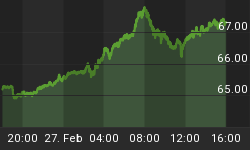Yesterday, I mentioned the likelihood that a recession is coming. The indicators for this are mostly from the manufacturing side of the economic ledger, and they are at this point merely suggestive. For example, the ISM Manufacturing Index is at 50.2, below which level we often see deeper downdrafts (see chart, source Bloomberg).
Capacity Utilization, which never got back to the level over 80% that historically worries the Fed about inflation, has been slipping back again (see chart, source Bloomberg).
Now, we have to be a bit careful of these "classic" indicators because of the increased weight of mining and exploration in GDP compared with the last few cycles. A good part of the downturn in Capacity Utilization, I suspect, could be traced to weakness in the oil patch. But at the same time, we cannot blithely dismiss the manufacturing weakness as being "all about oil" in the same way that Clinton supporters once dismissed Oval Office shenanigans as being "all about sex." Oil matters, in this economy. In fact, I would go so far as to say that while historically a declining oil price was a boon to the nation as a whole (which is why we never suffered much from the Asian Contagion: the plunge in commodity prices tended to support the U.S., which is generally a net consumer of resources), in this cycle low oil prices are probably neutral at best, and may even be contractionary for the country as a whole.
Whether we have a recession in the near term (meaning beginning in the next six months or so) or further in the future, here is one point that is important to make. It will not be a "garden variety" recession, in all likelihood. That is not because we have boomed so much, but because we are levered so much. There are no more "garden variety" recessions.
Financial leverage in an economy, just as in individual businesses, increases economic volatility. So does operational leverage (which means: deploying fixed capital rather than variable inputs such as labor - technology, typically). And our economy has both in spades. The chart below (source: Bloomberg) shows the debt of domestic businesses as a percentage of GDP. Businesses are currently more levered than they were in 2007, both in raw debt figures and as a percentage of GDP.

Investors fearing recession should shift equity allocations (to the extent some equity allocation is retained) to less-levered businesses. But be careful: some investors think of growth companies as being low-leverage but tech companies (for example) in fact have very high operating leverage even if financial leverage is low. Both are bad when earnings decline - and growth firms typically have less of a margin of safety on price. I tried to do a screen on low-debt, low-PE, high-dividend non-tech companies with decent market caps and didn't find very much. Canon (CAJ), Guess? Inc (GES) to name a couple of examples...and neither of those have low P/E ratios. (I don't like to invest in individual stocks in any event but I mention these for readers who do - these aren't recommendations and I neither own them nor plan to, but may be worth some further research if you are looking for names.)
On the plus side, economically-speaking, relatively heavy personal income taxation also acts as an automatic stabilizer. On the minus side, this is less true if the tax system is heavily progressive, since it isn't the higher-paid employees who tend to be the ones who are laid off (except on Wall Street, where it is currently de rigueur to cut experienced, expensive staff and retain less-experienced, cheaper staff). Back on the plus side, a large welfare system tends to be an automatic stabilizer as well. On the minus side, all of these fiscal stabilizers merely move growth from the future to the present, so the deeper the recession the slower the future growth.
And, of course - there is nothing that central banks can really do about this, unless it is to make policy rates negative to spur additional extension of negative-NPV loans (that is, loans to less-creditworthy borrowers). I am not sure that even our central bank, with its unhealthy fear of the cleansing power of recession, thinks that's a good idea.
There is some good news, as we brace for this next recession: while overall levels of debt are higher for businesses, financials, and households, the debt burden compared to GDP is lower for households and especially for domestic financial institutions (see chart, source Bloomberg).

Our banks are in relatively good health, compared with their condition headed into the last downturn. So this will not be a calamity, as in 2008. But I don't expect it to only be a "mild" recession, either - as if any recession ever feels mild to individuals!
You can follow me @inflation_guy!
Enduring Investments is a registered investment adviser that specializes in solving inflation-related problems. Fill out the contact form at http://www.EnduringInvestments.com/contact and we will send you our latest Quarterly Inflation Outlook. And if you make sure to put your physical mailing address in the "comment" section of the contact form, we will also send you a copy of Michael Ashton's book "Maestro, My Ass!"

















